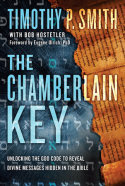The Chamberlain Key - a Review
 I'm a designer. I love things that are well designed. The cover of The Chamberlain Key was designed well enough to get me interested in picking it up.
I'm a designer. I love things that are well designed. The cover of The Chamberlain Key was designed well enough to get me interested in picking it up.The cover itself has an image referred to as temple scroll and there's a lot of hebrew in the background on the front cover that looks decorative at first; it's little things like that which made it so inviting to pick up. Before starting to read, I felt like the cover would give me a sense of what it was all about.
A quick flipping through the pages gauges that an editorial designer wasn't in use for the creation of this print job. Mainly indicated by hyphenations, single words or short amount of letters on one line. This isn't problematic, although a little distracting for my well-trained eyes. Additionally, having an editorial designer work with all the text and images would probably make the cost too high to get Smith's message out.
I'm also not much for religious stories.
Reading "The Chamberlain Key" as a fictitious story made more sense to me, but some passages as you get deeper into the story ends up reading more like you're at a sermon for whatever religion you happen to be. It will take out a block of text from another source and have it relate somewhere to something that is going on.
I'm skeptical and looking up "Timotheus" in Hebrew on Google translate actually loses a letter that was the basis to his entire theory. (additoinally looking "timothy/timotheus in hebrew" up in a google image search only ends up showing you the images from the book. - which kind of lost my basis for everything the book was trying to prove.
Had I not looked it up, "The Chamberlain Key" is a rather entertaining read, that comes off similarly to someone who wrote a diary or journal and was reflecting on it in their journal while writing about a main event going on.
Most of Timothy Smith's findings that were detailed in the book was relating to his family. There was about two instances I can recall where he mentioned something outside of his family within the bible.
The methodologies that he used to "unlock" the bible weren't thought out and had no structure or reason behind it. I'm okay with the idea of a feeling being in control of it, but there were too many instances where he would use different numbers to utilize his equidistant letter positioning decryption. Which might indicate that if one went through every verse of the bible using different letter spacing in each passage that one would find endless amounts of words that might relate to something else. Which could happen in just about any written work, some more intentional than others.
I was a little disappointed with the story line
the biggest disappointment I felt was how I correlated the information from the back of the book to what happened. Timothy Smith is introduced as being an appraiser and conservator of artifacts and antiquities. The way the summary was worded I wanted to think that he would have come across the oldest Hebrew text of the bible as one of his jobs - but he really only reached out for a copy of the oldest text available through very normal means. The story line otherwise was very streamlined aside for some spots where he brought in other references to passages.
Above all else, I do appreciate that this book was a way to tell the story of someone who was losing faith in religion who found hope and dedicated the rest of his life passionate about something he wanted to share with the world. He wants to invite investigation and consideration to the Hebrew scriptures in ways we never thought of before. And looking at things in new ways is something that should always be encouraged.
Additional Resources:
Author Bio
More Info
FTC Disclaimer: I received this book from Blogging for Books for this review.

Comments
Post a Comment